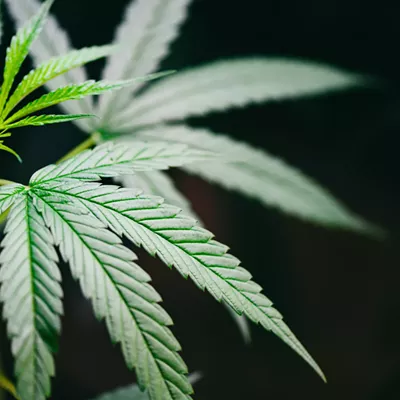
In August, the Arizona chapter of the National Organization for the Reform of Marijuana Laws director and Southern Arizona NORML founder Mike Robinette resigned from his volunteer position after more than four years of successfully leading the organization.
In the vacuum left by his departure, the SOAZNORML contingency has become younger and more diverse as it seeks to expand its reach in the cannabis political landscape.
“We have a whole new face of Southern Arizona NORML now: It’s a whole new look and we’re wanting to include the younger community and reach out to them as much as possible,” said SOAZNORML co-director Kelly Davis. “A lot of that community thinks that regulations have been set and we’re good to go. Well, that is not necessarily the case.”
Davis, a mother of three and cannabis business entrepreneur, has taken over a key position in the organization and along with fellow cannabis advocate Samba Jarju and a handful of volunteers, have picked up the gauntlet and are moving the organization forward.
Davis founded Kelly’s Natural Aromatherapy in 2014, focusing on CBD- and Delta-8-based products, and Jarju, an African American Navy veteran, established Tucson House of Cannabis (THC) in 2018.
Davis is a Tucson native and multi-generational Arizonan who has a deep and personal connection to medical marijuana and CBD. Throughout her adult life and three difficult pregnancies, she has depended on the plant to help get past health issues without relying on heavy pharmaceuticals.
As a child of the ’90s, Davis was immersed in D.A.R.E. (Drug Abuse Resistance Education) at school, but said she never bought into it. She said she started smoking pot as a teenager and found her calling at a young age.
“I knew when I was 11 that I wanted to be a part of NORML,” Davis said. “I was in the D.A.R.E. era, but our brains aren’t frying on the stove. Because of that, I knew the government had something against the plant, but early on in my life, I recognized that the plant was there for medicinal use.”
Her medical problems have been numerous, from anxiety, depression and epilepsy to PTSD, as well as injuries from car crashes.
But Davis has also suffered from endometriosis, a condition that affects the female reproductive system, as well as hyperemesis gravidarum, a complication that causes life-threatening nausea during pregnancy.
When doctors wanted to place her on a Zofran drip—an anti-nausea medicine used for cancer patients that can cause serious and life-threatening side-effects—Davis knew she would rather stick with natural medicines rather than opioids or their synthetic counterparts.
She credits the plant with helping her kick such drugs as Xanax and Tramadol—an opioid used to combat chronic pain.
“I’ve smoked through my pregnancies because I had to,” she said. “During my last pregnancy, I was sick for 34 weeks, but now I have a 27-year-old, a 25-year-old and a nine-year-old, and my older kids are productive members of society: They both graduated high school with flying colors, they both graduated from college and they both have kids that are perfectly fine. I can tell you through and through that it didn’t affect them at all.”
She’s been NORML-adjacent for some time, but it was back in June she decided she wanted to get more deeply involved with the organization. Less than two months later, Davis was granted her wish, albeit not to the extent she expected.
Robinette’s departure was a shock to the organization, but was not wholly unexpected given the amount of work he did throughout the past few years. During the runup to the 2020 election when Arizona voters passed Prop 207 legalizing adult-use, recreational marijuana, former Arizona NORML director, the late Mikel Weisser died in May 2020.
It was at that point Robinette shouldered the responsibilities of leading the consumer advocacy group during one of the most critical times in its existence.
According to Jon Udell, who now shares co-directorship of the state chapter with board member Allison Stein, continuing AZNORML’s mission will require contributions from a wide variety of members to fill all of the roles Robinette took on himself.
“It’s a lot of work and Mike certainly shouldered a lot of it,” Udell said. “He would just do whatever it took to keep the wheels turning. What we’re going through in SOAZNORML is similar to what we’re dealing with at AZNORML as a whole with trying to spread Mike’s responsibilities out amongst a group of people, and have us all still keep our jobs on top of it. That’s easier said than done.”
In addition to diversifying the new leadership of SOAZNORML, Jarju is bringing a wealth of experience, both good and bad, to the organization and opening up a traditionally marginalized community to cannabis advocacy.
Jarju served in the U.S. Navy from 2004-2012 performing maritime interdiction for counterterrorism, anti-piracy and drug smuggling, among other duties.
“We were chasing cartels and had to learn how they operated and the things they did,” he said. “We got to see the brutal end and the positive sides of not just the cannabis industry, but the world as a whole.”
With deployments to the Caribbean and Central America, West Africa, East Africa, North Africa, the Middle East and the Horn of Africa, Jarju saw the world through a unique perspective, but when he returned to the U.S. the sum of his experiences began to catch up.
By 2015, exposure to toxins and PTSD began to affect his health so he turned to cannabis to ease his pain. At the same time, his father was suffering from multiple myeloma. Jarju himself almost died in 2017 after he “flatlined” for 16 minutes when a thyroid condition put him in a coma.
“Cannabis has been something that was there for me when my father was passing, and it was something that I wanted to share with him,” Jarju said. “I had already seen how much it could help me, not just by body and my mind, but by being able to find love and compassion again, which was something that was so hard after losing parts of my soul overseas.”
In addition to his service, Jarju has experience in the tech field, working for the Intel Corp for three and a half years after he left the service.
In all, Jarju and Davis bring a wide variety of experiences to the organization along with energy and conviction to bring NORML’s message to a more diverse and younger demographic.
“It’s at a point where as more people find out about the terrible things that have happened and the injustices that are going on, they are realizing there’s common ground,” Jarju said. “The foundation that we need to build on is the understanding that there is common ground, especially in a state like Arizona.”
But it all comes back to a loose organization of volunteers trying to guide legalization through legislation and providing information to the public as they try to balance their lives and experiences through work that is critical to the future of cannabis users throughout the state.
“The big challenge is that it’s hard to have an all-volunteer organization function at such a high level, because you’re looking for people that are really skilled,” Udell said. “Most people, unless you’re independently super-rich, need to work to keep a roof over their heads.”
For more information, or to volunteer or sponsor Arizona NORML or Southern Arizona NORML, go to arizonanorml.org or soaznorml.org or find them on Facebook.
Nuggets: Biden parts the waters
President Joe Biden shocked the world last week, when on Thursday he announced pardons for all low-level federal cannabis possession charges.
In a press release dated Oct. 6, 2022, Biden stated the following:
“As I often said during my campaign for president, no one should be in jail just for using or possessing marijuana. Sending people to prison for possessing marijuana has upended too many lives and incarcerated people for conduct that many states no longer prohibit. Criminal records for marijuana possession have also imposed needless barriers to employment, housing, and educational opportunities. And while white and Black and brown people use marijuana at similar rates, Black and brown people have been arrested, prosecuted, and convicted at disproportionate rates.”
Biden has historically been a proponent of harsh penalties for even the most benign drug infractions, so the Weedly applauds the idea that progress on a federal level is being made.
In addition to the nationwide pardon, the Administration is encouraging governors in all 50 states to follow his example. He has asked the Department of Health and Human Services as well as the Department of Justice to consider the impacts of rescheduling cannabis, now a Schedule I narcotic on the same level as heroin and LSD, and even higher than the classification of fentanyl and methamphetamine, which are perpetually at the heart of drug-related “epidemics” in the U.S.
There are several classifications for drugs in the U.S. and the lists can seem random at times, but as a general rule, as the classification number is higher, the potential for “abuse” gets lower.
For instance, Schedule 3 includes substances such as anabolic steroids and testosterone; Schedule 4, drugs like Xanax, Valium and Ambien, while Schedule 5 includes substances with a lower possibility of abuse than Schedule 4. The Weedly believes that might be where one would find ice cream and caffeine, but we don’t have time to Google it.
White House officials say the pardons will affect somewhere in the neighborhood of 6,500 people, as well as thousands more in the District of Columbia.
But “rescheduling” is not sitting well with many advocates, as there would still be unreasonable penalties for anyone caught with reasonable amounts of the plant.
“Although President Biden’s announcement today does not end the stain of federal prohibition, it could be a significant step in that direction. We applaud the president’s long-overdue application of common sense to federal drug policy and hope our country will finally end the long-running joke of medical marijuana patients being treated no differently than heroin addicts in the eyes of federal law,” Arizona NORML acting Co-Director Jon Udell stated in a press release in the hours following the announcement. “We are also encouraged by the president’s decision to pardon thousands of cannabis consumers. From hosting 60 expungement clinics, we know too well the collateral consequences that cannabis convictions bring, as well as the economic inefficiencies they produce for society at large. We call on Gov. Ducey and Attorney General Brnovich to use their full authority to unwind the consequences of Arizona’s longtime war on cannabis consumers.”
Randal McDonald, supervising attorney at the Post-Conviction Clinic at Arizona State University’s Sandra Day O’Connor College of Law, said that while the President’s action is a good start, there is still a lot of work to be done before there will be justice for cannabis consumers caught up in the decades-long war on drugs.
“It’s an excellent start and a step in the right direction, but it probably won’t affect a lot of people,” McDonald said. “Our initial reaction was, what is this going to mean to clients in state court? Probably not much. We’ll have to see what the federal courts do, but a pardon doesn’t do anything to seal your record.”
McDonald, who works with the Arizona Justice Project, an organization charged with leading the expungement program in the state and funded by monies specified in Prop 207, said that real reform will have to come through Congress.
As far as dealing with the records of people with low-level marijuana convictions though, he believes the expungement system is a better model.
“Expungement is better because when they seal the record it’s like it never happened,” he said. “A pardon won’t go as far as that, but we don’t yet know if the DOJ will seal the records. It’s still entirely possible it will still be on the record and effect things like jobs and housing for those with convictions.”
Arizona’s expungement program began in July 2021 and the process has been slow and laborious, at best.
According to the AJP, as of March 2022 there have been 14,458 expungement petitions submitted to the courts, but no number has been given for the total number granted.
The AJP has worked to determine the number of petitions that have been granted through public records requests, but the responses have been piecemeal from each county.
According to the communications director for the state Supreme Court, as of March 2022, the following number of petitions have been granted:
• Gila County, 35 granted as of Aug. 4;
• Mohave County, 12 granted as of
July 20;
• Navajo County, 21 granted as of
July 20;
• Pima County, 70 granted as of June 30;
• Santa Cruz, four granted as of July 21;
• Yavapai, 102 granted as of July 20.
The Maricopa County Attorney’s Office has led the way with expungements in the state and as of late July, was approaching 15,000 in total.







